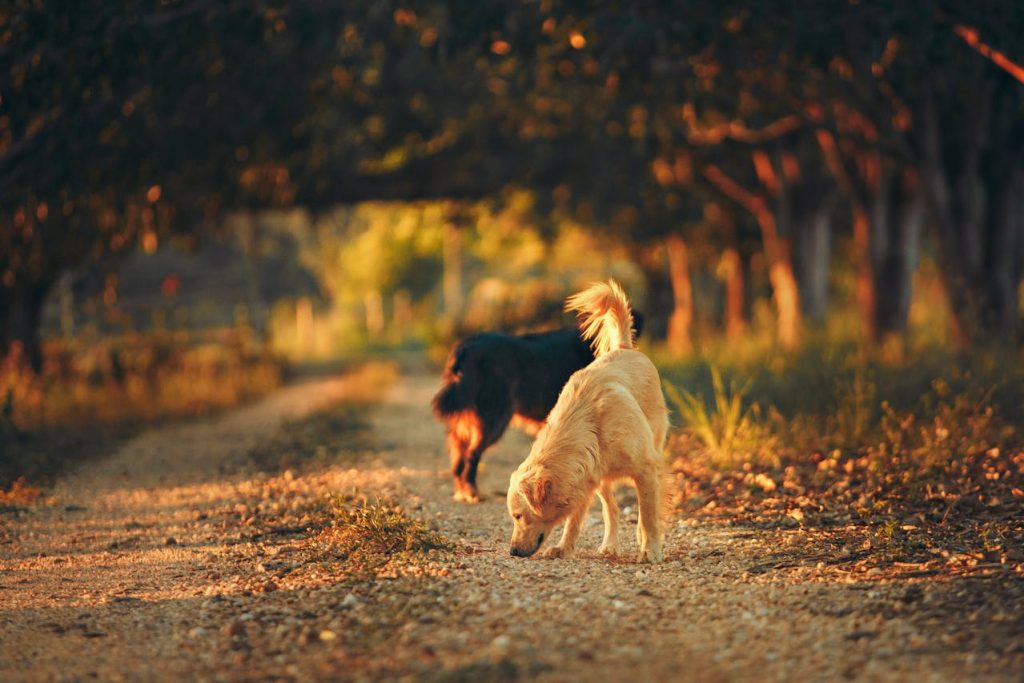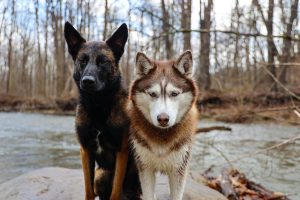Onion (Allium cepa) is a bulb vegetable comprising sulfur compounds harmful to dogs. Consumption can lead to gastrointestinal upset, anemia, and potential organ damage. Never feed dogs onions, as they pose serious health risks.
In this post, we’ll see whether you can feed your dog onions, what are their benefits, harmful effects and most importantly, things to know (facts) about onions. Additionally, we would also take a look at the nutritional value and the proper way to feed dogs, onions. Finally, we will answer the most important questions about this topic and share the final verdict.
But, firstly – let’s see, can dogs eat onions?

Table of Contents
ToggleCan Dogs Eat Onions Safely?
No. Dogs cannot eat onions. Onions contain compounds that can lead to gastrointestinal upset, anemia, and organ damage in dogs. They should be strictly avoided. Onions lack nutritional benefits for dogs and pose serious health risks.
Benefits of Feeding Your Dog Onions
There are no benefits to feeding your dog onions and it is not recommended that you do so.
Harmful Effects of Feeding Your Dog Onions (5 Harms)
Onions can be harmful to dogs. Here is a list of 5 potential harmful effects of onions for dogs:
- Hemolytic Anemia: Onions contain compounds that can destroy red blood cells, leading to hemolytic anemia.
- Gastrointestinal Upset: Consumption of onions may cause vomiting, diarrhea, and abdominal pain in dogs.
- Organ Damage: Toxic components in onions can lead to damage to a dog’s liver and kidneys.
- Weakness and Lethargy: Dogs may exhibit signs of weakness, lethargy, and reduced activity after consuming onions.
- Elevated Heart Rate: Onions can cause an increase in a dog’s heart rate, leading to cardiovascular issues.
Things to Know About (Facts) about Onions
In this section, we will discuss some facts and things to know about onions.
| Attribute | Description |
| Scientific Name | Allium cepa |
| Family | Amaryllidaceae |
| Toxic Compounds | Contains thiosulfate compounds, harmful to dogs’ red blood cells |
| Nutrients | Low in essential nutrients for dogs, lacking in significant vitamins or minerals |
| Culinary Use | Commonly used as a flavoring agent in human cuisine |
| Appearance | Bulbous vegetable with layers of thin, papery skin |
| Odor | Characteristic pungent aroma |
| Storage | Should be stored in a cool, dry place away from pets |
| Precautions | Toxic to dogs if ingested in any form |
Nutritional Value of Onions
In this section, we will discuss the nutritional value of onions.
| Nutrient | Amount per 100 g | Units |
| Calories | 40 | kcal |
| Protein | 1.1 | g |
| Fat | 0.1 | g |
| Carbohydrates | 9.3 | g |
| Fiber | 1.7 | g |
| Sugar | 4.7 | g |
| Calcium | 23 | mg |
| Iron | 0.2 | mg |
| Magnesium | 10 | mg |
| Phosphorus | 29 | mg |
| Potassium | 146 | mg |
| Sodium | 4 | mg |
| Zinc | 0.2 | mg |
| Vitamin C | 7.4 | mg |
How to Feed Dogs Onions?
Since onions are harmful to dogs, a safe alternative is steamed or boiled sweet potatoes. Here’s how to feed your dog sweet potatoes safely:
How to Feed Your Dog Sweet Potatoes:
- Peel and chop sweet potatoes into bite-sized pieces.
- Cook sweet potatoes thoroughly by boiling or steaming until tender.
- Allow sweet potatoes to cool completely before serving.
- Offer sweet potatoes as an occasional treat, not as a primary meal replacement.
- Monitor your dog for any adverse reactions after consumption.
Things to Take Care of (Precautions) before feeding your Dog Sweet Potatoes:
- Ensure sweet potatoes are plain and free from any added seasonings or ingredients.
- Avoid feeding sweet potatoes in excessive quantities to prevent digestive upset.
- Check for signs of allergies or sensitivities before introducing sweet potatoes into your dog’s diet.

Can Dogs Eat Alternative Forms of Onions?
In this section, we will discuss if dogs can eat alternative forms of onions such as onion powder, cooked onions and more.
Can dogs eat raw onions?
No. Dogs cannot eat raw onions. Raw onions contain compounds harmful to dogs, leading to gastrointestinal upset and potential organ damage.
Can dogs eat cooked onions?
No. Dogs should not eat cooked onions. Cooked onions still contain toxic compounds that can harm dogs’ health.
Can dogs eat onion powder?
No. Dogs cannot eat onion powder. Onion powder is concentrated and poses the same risks as raw onions for dogs.
Can dogs eat onion flakes?
No. Onion flakes are not safe for dogs. Like raw onions, they contain toxic compounds that can be harmful to a dog’s health.
What Other Vegetables can a Dog Eat?
Dogs can eat a variety of vegetables, including:
- Carrots
- Green beans
- Sweet potatoes
- Pumpkin
- Peas
- Broccoli
- Spinach
- Zucchini
- Cucumber
- Celery
Always introduce new vegetables gradually and monitor for any adverse reactions. Avoid seasoning or adding sauces to vegetables given to dogs, and consult with a veterinarian if unsure about specific vegetables or quantities for your dog’s diet.
Frequently Asked Questions (FAQs)
In this section, we will discuss some frequently asked questions regarding onions and feeding them to dogs.
What is hemolytic anemia?
Hemolytic anemia is a condition in dogs caused by the destruction of red blood cells, leading to insufficient oxygen transport in the body. It can result from toxins like those found in onions and garlic, certain medications, or underlying health issues. Symptoms include lethargy, weakness, and jaundice. It contrasts conditions like polycythemia, an increase in red blood cell count.
Is garlic also harmful to dogs?
Yes, garlic is harmful to dogs. Like onions, garlic belongs to the Allium family and contains substances that can cause oxidative damage to red blood cells, leading to hemolytic anemia. Although garlic is more potent than onions, both can be toxic even in small quantities. Safe alternatives include pet-specific treats or vegetables like carrots.
Are onions more toxic to dogs than apples?
Yes, onions are more toxic to dogs than apples. Onions contain compounds that can cause hemolytic anemia in dogs, while apples, barring their seeds which contain cyanide in small amounts, are generally safe in moderation. Unlike onions, apples can be a healthy treat, offering vitamins and fiber.
What are some common vegetables that are safe for dogs to eat?
Common vegetables that are safe for dogs include:
- Carrots, which are low in calories and high in fiber and vitamins
- Cucumbers, known for their hydrating properties
- Green beans, offering vitamins A, C, and K
- Pumpkin, which is beneficial for digestive health
Each of these offers various nutrients beneficial to canine health.
Conclusion
Concluding, onions and their Allium relatives like garlic and chives, with their pungent flavors and culinary versatility, pose significant health risks to dogs, leading to conditions such as hemolytic anemia. This article underlines the importance of keeping such vegetables away from canine diets, reinforcing the verdict: dogs cannot safely consume onions.



